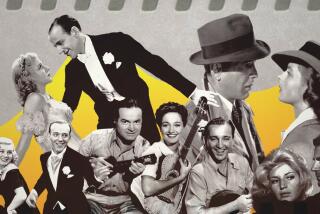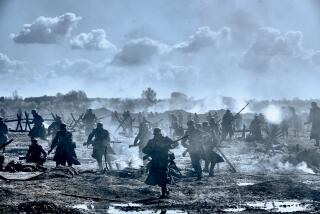Putting Howard Hughes’ films back on the radar
- Share via
Before he produced and directed the 1930 World War I epic “Hell’s Angels,” Howard Hughes was already an established Hollywood producer.
One of his productions won an Oscar for its director, another was nominated for best film, and a third even had a daring nude scene by one of silent cinema’s leading femmes fatales.
But unlike “Hell’s Angels” or even his 1943 western, “The Outlaw” -- which is remembered more for Jane Russell’s cleavage than the plotlines -- these three silent films have all but disappeared from view.
But with Martin Scorsese’s “The Aviator,” which lands in theaters Friday, there is a renewed interest in Hughes as a filmmaker. “Two Arabian Knights,” “The Racket” and “The Mating Call” are receiving their TV premieres tonight on Turner Classic Movies as part of a Hughes tribute that is the result of hours of digital restoration work by Flicker Alley, a boutique DVD production company, with assistance from the University of Nevada, Las Vegas’ film department and Turner Classic Movies.
Jeff Masino, whose Flicker Alley previously presented restored versions of such silent films as Lewis Milestone’s “The Garden of Eden,” was the driving force behind getting these films digitally restored.
After restoring “Garden of Eden,” he became interested in the career of Milestone, who directed “Two Arabian Knights” and “The Racket.”
After doing Internet research and checking in with silent film newsgroups, he discovered that the three Hughes’ films were housed at the University of Nevada, Las Vegas. They have been stored there for the last decade as part of the Howard Hughes Collection.
“I contacted professor Hart Wegner and I worked with him and the current chair,” says Masino. “It was a long process of them getting to know me. Their current arrangement with the Howard Hughes Corp. is that the material would only be available for research and study purposes.”
Masino made several trips to Las Vegas to view the collection.
“They were in fairly rough condition,” he recalls. “I knew there was going to be some work [needed]. There were jump cuts in ‘Two Arabian Knights’ ... things needed to be put back together. There was no directed-by credit card in ‘Two Arabian Knights.’ I pulled that [title card] from ‘Garden of Eden’ because the backgrounds matched.”
The restoration project became a reality, says Masino, with funding from TCM. Over the last decade, TCM has presented several silent film restorations and reconstructions, including Erich von Stroheim’s “Greed” and Tod Browning’s “London After Midnight.”
The Hughes films were transferred to tape at Ascent Media in Burbank; the restoration work was done at Advanced Digital Services in Hollywood.
“We pieced the best elements together from the different materials,” Masino says, adding that ADS “spent 250 hours working on ‘The Racket’ and ‘Two Arabian Knights’ alone.”
ADS used digital filters to get rid of the jumpiness, bumps and jitteriness film shrinkage causes. The staff then restored each damaged frame digitally by hand, eliminating splice marks and scratches.
“We did as much as we could,” Masino says.
The films are not only historically significant but also drew critical attention in their day. The 1927 “Two Arabian Knights” won Milestone a best comedy director Oscar -- the only one ever given -- beating out Charlie Chaplin for “The Circus” and Ted Wilde for Harold Lloyd’s “Speedy.” A buddy comedy, “Two Arabian Knights” stars Louis Wolheim and William Boyd as two-fisted American soldiers who escape from a German POW camp and rescue a princess played by Mary Astor.
“The Racket,” a 1928 crime melodrama, was nominated for a best film Oscar and revolves around the bootleg mob wars in Chicago in the 1920s.
The legendary James Cruze directed 1928’s “The Mating Call,” a romantic drama about a World War I veteran (Thomas Meighan), his ruthless former wife (Evelyn Brent) and his new Russian immigrant wife (Renee Adoree), who likes to skinny-dip.
Masino hopes that the telecasts will prompt one of the nation’s film archives, such as UCLA Film and Television Archive or the Academy Archive, to restore the actual film elements.
Although these digital restorations aren’t perfect, Masino says, “I think silent film aficionados will gladly accept these films because they appreciate how rare they are.”
More to Read
Only good movies
Get the Indie Focus newsletter, Mark Olsen's weekly guide to the world of cinema.
You may occasionally receive promotional content from the Los Angeles Times.








